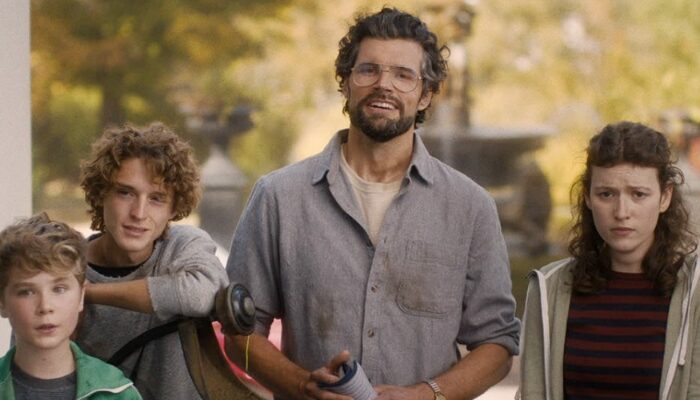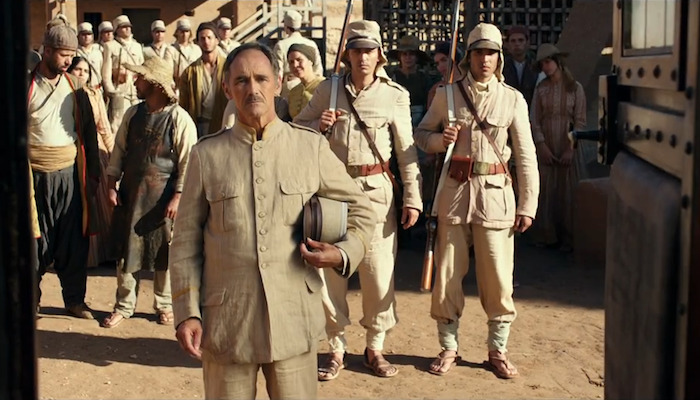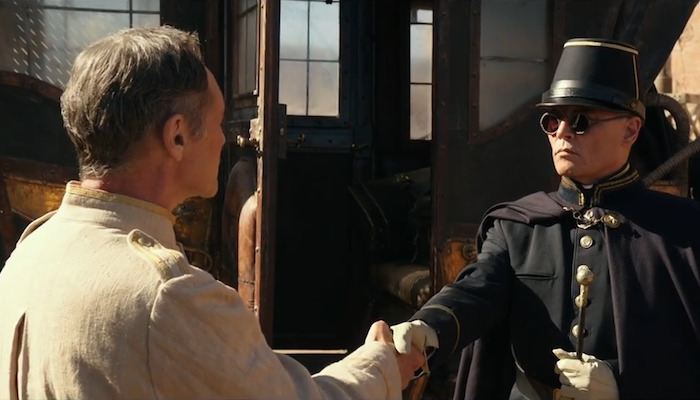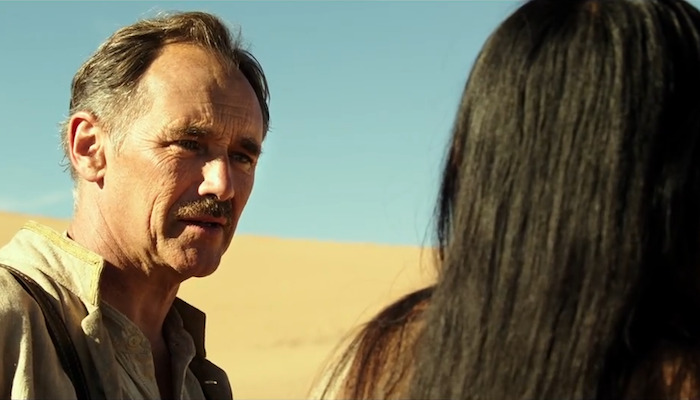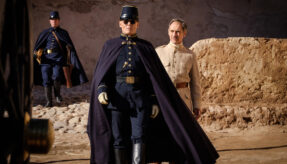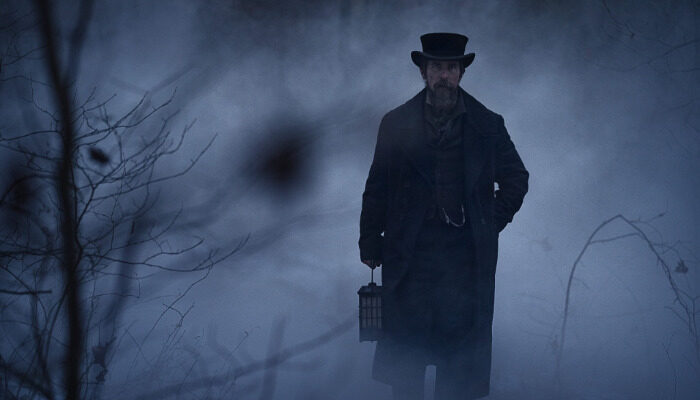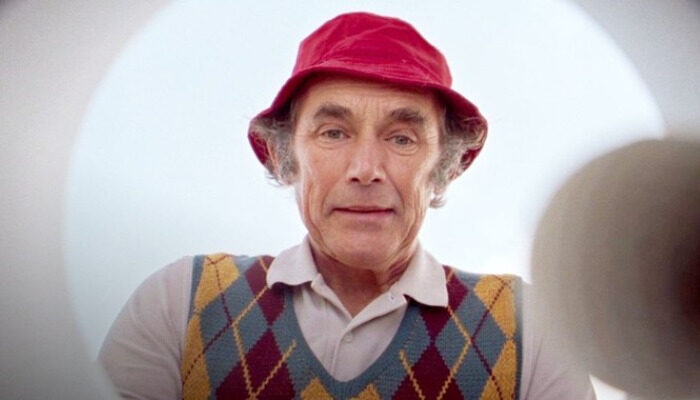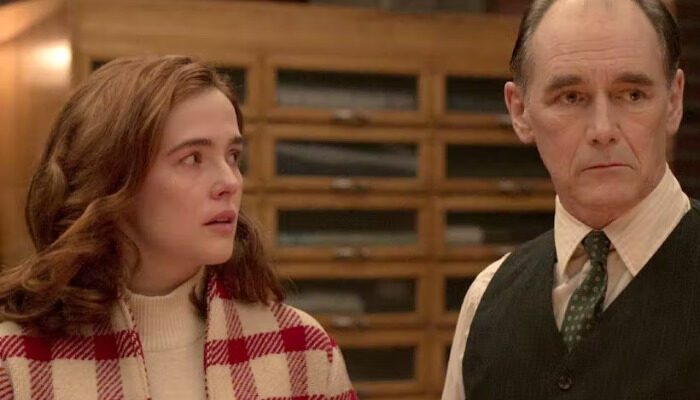Film Review: WAITING FOR THE BARBARIANS (2019): A Work of Historical Criticism That Manages Meaning Despite Excessive Ambiguity
 Waiting for the Barbarians Review
Waiting for the Barbarians Review
Waiting for the Barbarians (2019) Film Review, a movie directed by Ciro Guerra, and starring Mark Rylance, Johnny Depp, Robert Pattinson, Gana Bayarsaikhan, Greta Scacchi, David Dencik, Sam Reid, Harry Melling, Bill Milner, Isabella Nefar, David Moorst, Joseph Long, and Nayef Rashed.
Some films get didactic in their politics, while others are too obscure. Somehow, Ciro Guerra’s adaptation of J. M. Coetzee’s 1980 novel Waiting for the Barbarians manages to be both. Luckily for Coetzee the story is better suited to the cinematic form, and – despite Coetzee writing the screenplay himself – makes for a more palatable experience.
In an unspecified desert seized by an unspecified empiric power, a Magistrate (Mark Rylance) oversees the affairs of an outpost village. While not a benevolent leader, per se, his docile demeanor and fear of confrontation has him attempting to appeal to the best intentions of all parties – townspeople, soldiers, and prisoners alike. He has his own vices but he keeps them to himself, and that sense of quiet tolerance carries through to his own style of governance.
One summer day Colonel Joll (Johnny Depp), a leading figure in the empire’s police force, arrives at the outpost. Convinced that the “Barbarians” – nomadic natives to the surrounding desert land – are mobilizing with plans to attack the empire, he leads a band of soldiers out into the desert to capture them while commandeering the outpost’s barracks as interrogation headquarters. The Magistrate, while not necessarily sympathetic to the Barbarians, isn’t convinced that they’re a threat, either. Rather, he believes it to be drummed-up paranoia by the empire’s ruling forces to elicit a militaristic response for rapid expansion. He doesn’t agree with Joll’s tactics, but he tolerates them nonetheless under the assumption that most of the atrocities will take place far outside his purview.
Months pass since the initial mission and the Magistrate assumes operations have gone back to normal. But on the outskirts of the fort he finds a disabled Barbarian woman (Gana Bayarsaikhan), fighting for her life. The Magistrate pities her and takes her in, soon learning of the brutal acts that Joll and his soldiers committed against her. The Magistrate finds it increasingly difficult to reconcile his role in the empire with the violence committed against these “Barbarians”, and is put at a crossroads when the police force returns with the intention of starting a full-on war.
Roger Ebert once said that movies “are like a machine that generates empathy”. With that in mind, you’d think one wouldn’t feel the need to make films so vague in their metaphors to elicit compassion for a cause or belief. As a filmmaker, I get that you’d want to have your themes resonate with the widest audience possible, but if crafted correctly your film should be able to convey universal messages of oppression, revolution, and liberation regardless of how specific its particular subject is. Waiting for the Barbarians is not that. It’s painted with very broad strokes, purposefully covering over every conceivable historical connection that you can make.
I can understand why Coetzee structures the story as such: he’s showing imperialist expansion as a central facet of (an assumedly Eurocentric) society that’s not particularly unique to any one country or group. Colonialist violence is a force that continues to manifest itself in various ways but through structurally similar executions. By pointing this out so directly, Coetzee eschews empire without any room for misinterpretation.
But such universal messages are what we’re supposed to glean from other similar stories in the first place. This is what we feel about the National Liberation Front fighting for independence in The Battle of Algiers; this is what we feel about Black liberation in the United States while watching Spike Lee’s brilliant Malcolm X; this is what we learn initially sparked the Iranian Revolution in Marjane Satrapi’s bittersweet Persepolis; hell, this is even what we can surmise from Guerra’s previous effort Embrace of the Serpent, about the horrors wrought against the native tribes in South America and the mess of bastardized cultures that sprung up in the wake (that film’s second scene at the monastery has never left my mind). Waiting for the Barbarians’ deconstructionist approach to narrative doesn’t play as ineffective, but rather banally so. Without any specific ties to a particular historical instance but structured as if it has one, it makes us wonder what the film’s intended purpose is – or at least the film’s intended audience.
Perhaps this would’ve worked had the setting not been so grounded in realism and rooted in a world that seems very much like our own. Racial and ethnic metaphors in both science fiction and fantasy stories have become rote (if not downright offensive) as of late, but a more definitive unreal setting might’ve better suited Waiting for the Barbarians’ symbolic dubiousness.
Although to be fair to Guerra, he manages to make the story watchable and engrossing. Unlike Coetzee’s original novel – which is copiously stuffed with the Magistrate’s drawling inner monologues – Guerra adds life to the story’s world through his contrast of beautiful vistas and a calm approach to the horrors his characters perpetrate. While we still primarily focus on the Magistrate we’re allowed a distance from his overbearing, navel-gazing viewpoint that the novel does not. The result is that our realizations of his own cognitive dissonance at the film’s beginning and his own virtuous epiphanies by the film’s end carry much more emotional resonance. The film also emphasizes the ultimate cowardice of those in power, and Guerra brilliantly presents the chaos that results from their moral ineptitude. In those ways, Waiting for the Barbarians is one of those few literary adaptations that actually improves upon its source.
It’s nice to see Rylance be front-and-center here, stepping up from his relegated supporting-role status as of late. He embodies the Magistrate’s own sense of cowardice well but inflects it with an overbearing sense of timidity, accentuated by his soft glances and quiet stutters. He’s a selfish man who doesn’t want to create trouble, and his lack of initiative is less evident of incapability than it is a symptom of profound loneliness. It could be argued that the Magistrate is a proponent of a white savior narrative, but given the dour conclusion of the film – and the closing message of empire eventually eating itself – he sure isn’t that effective of a savior. Bayarsaikhan is quietly moving in her character’s stoic determination; Depp is terrifying; and Pattinson is always a delight to watch, no matter how big a scumbag he plays.
In a time when representation is at the forefront of a national (if not international) dialogue on visibility in the arts, and the dangers of cultural appropriation on the whole are under the microscope, it’s odd that something as nebulous as Waiting for the Barbarians still manages to argue for relevancy. It’s not for lack of meaning, but its approach to historical analysis from a genre deconstructionist mindset just leads to excessive ambiguity. Coetzee isn’t off-base, but his story’s vagueness leaves it all a bit too bland.
Rating: 6/10
Leave your thoughts on this Waiting for the Barbarians review and the film below in the comments section. Readers seeking to support this type of content can visit our Patreon Page and become one of FilmBook’s patrons. Readers seeking more film reviews can visit our Movie Review Page and our Movie Review Pinterest Page. Want up-to-the-minute notifications? FilmBook staff members publish articles by Email, Twitter, Instagram, Tumblr, Pinterest, and Flipboard.
Related Articles
FilmBook's Newsletter
Subscribe to FilmBook’s Daily Newsletter for the latest news!

